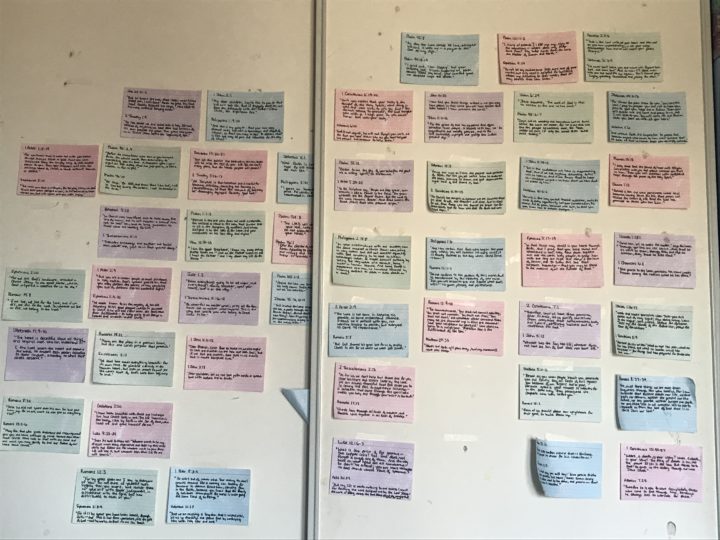You probably have a bunch of different feelings, thoughts, and ideas when the topic of the Bible comes up.
Maybe you are in a season where studying the Bible is exciting. You can wholeheartedly say “I am formed by Scripture.”
Or you’ve been reading with others and you’re honestly wondering how to disagree in a Bible study.
Maybe you’re new to all this and saying something like “I want to read the Bible. How do I start? Where do I start?”
Or maybe you’re like me and right now, reading the Bible feels just plain boring.
Abiding, meditating, and dwelling on Scripture
Regardless of your present relationship with the Bible, in it we see a repeated theme: Scripture should be an integral part of our lives.
The Israelites were told that the words Moses was commanding to them should be on their hearts (Deuteronomy 6:6).
In Psalm 1:2, the author talks about the need to meditate on God’s law all day and all night.
Fast forward to the New Testament: Jesus tells us in John 15:7 to abide in his word. In Colossians 3:16, Paul writes that “the word of Christ [should] richly dwell within you.”
Scripture should be on our hearts.
We should be meditating on and abiding in it day and night.
It should richly dwell within us.
This seems all well and good, but how do we actually do this with the right attitude and perspective? Especially when routines get stale and the Bible starts to feel boring?
Let’s briefly look at what some of these words mean, before diving into some practical ideas of how to abide, or dwell, in Scripture well.
Let’s start with abide. Abiding means to remain, continue, or stay.
Meditating means to linger over, emphasize, or ponder in thought, speech or writing.
Dwelling means to inhabit, settle, live with.
So when it comes to the Bible, we’re talking of staying in, lingering over and living with God’s words, not just once a day but continually throughout our day. That’s the implications of those words, right? It’s a continuous, ongoing act.
But how can we do that? Because I don’t think Jesus necessarily means for us to walk around with our print or digital Bible open all the time.
There are lots of different ways to incorporate Scripture throughout our day, but here are four ways that I have found helpful for engaging with God’s Word.
1. Keep it visual
Is there a verse or section of Scripture that is particularly meaningful to you right now? Write it out and make it visible. When we see visual reminders, it prompts us to think and engage.
Maybe it’s a post-it note stuck to your bathroom mirror. Maybe it’s a cue card taped above your kitchen sink (I swear cue cards are still a thing!). Maybe it’s a graphic as your desktop (Canva is a great free graphic design resource if you want to create something).
Pick a place where you know you will keep seeing this verse. Take a couple of moments to read it every time you pass by. Meditate on it. Mentally engage with it in short, but ongoing, increments of time.
2. Connect with the real world
Physical objects themselves can also be linked to particular Scripture passages, so that as you see or use these objects, they can bring God’s Word to mind.
For example, I have a fish tank in my bedroom at my parents’ house. It reminds me of Matthew 4:19-20, where Jesus famously invites his disciples to stop fishing for fish, to be able to fish for people. It’s a physical reminder for me of what Jesus calls me to.
Maybe you have some house plants which can become a reminder not to worry, when they are mentally linked to Matthew 6:28-30, where Jesus points out that if God cares for short-lived plants, he will care for human needs.
Or a particular tree could serve as a reminder of the analogy between a well-watered tree and those who trust in God, as found in Jeremiah 17:7-8.
Or if your window looks out over a city, it could prompt a meditation on how Jesus wept over the city of Jerusalem in Luke 19:37-44.
Hopefully you’re getting the idea, but if not, here is a question for you to consider:
Where are there connections between what you’re reading and what you’re encountering in daily life?
3. Respond creatively
Maybe it’s through painting, maybe it’s through writing, maybe it’s through building. Take time to respond to what you’re reading. For me, it’s water colours. Creating a basic painting and creating word art on it. It’s not perfect. It’s not marketable. But it’s meaningful to me and is a response to Scripture and what God is teaching me.
Another way for me to engage is through journaling, specifically rewriting Psalms and personalizing them to what I’m experiencing by using their themes. It helps bring focus to my prayers.
Perhaps you can try building or creating something unique to your own hobbies, such as a recording of you reading a passage of Scripture. Respond creatively. Think outside of the box so that Scripture becomes integrated all throughout your day, not just when you wake up or go to bed.
4. Quit perfection (it doesn’t exist)
One final thing to note. Don’t wait for the perfect time or wait until a later date. Find a way to incorporate your vision–now.
When I was in university and still living at my parents’ house, I would say to myself, when I move out I will create a wall of Scripture. But then I reached a point when I realized that I still had at least three years left of living at home. That’s a long time to wait. So I improvised and used what I had.
I used permanent markers and cue cards. And as I read the Bible I would write out verses and stick them on my closet wall. It wasn’t aesthetically pleasing, but it was honest, and I believe it reflected my real life, how imperfect it really was.

Even now, after moving out from my parents’ home, I still don’t have a wall filled with Bible verses. My apartment is too small and is shared with two other people, so I don’t have a free wall to use. So again, I improvise. I use what I have, like small chalkboards to write a Scripture for the month, leaving them where I will see them. I also got a map of my current city and paraphrased Matthew 6:10 over it, “Your kingdom come, your will be done, in “Montréal,” as it is in Heaven.”
None of these examples above are Instagram-worthy, or even need to be shared with others. I don’t know how to do fancy calligraphy writing or beautiful watercolour techniques. They are extremely basic and maybe always will be. And that’s okay.
But in any case, I want to have the heart and mindset of the widow in Luke 21:1-4, who comes with all that she has and gives it to God as an offering. However small or insignificant (may I add, imperfect) it may seem.
The point is to connect with God
At the end of the day, remember God’s heart behind this. The idea of having Scripture on our hearts, to abide and dwell in, comes from God’s desire to be in relationship with us.
He wants to speak to us.
He wants to spend time with us.
He wants to help us become more like Jesus. And what’s one of the ways in which that happens? By reading and meditating on his Word throughout our day.
Will we do this perfectly? Nope (we’re still human).
Will we forget to pay attention to the verse on the chalkboard or the sticky note? Most likely.
Will we get into a rhythm of Scripture meditation and then lose it at some point? Possibly.
But may we be continually learning how to incorporate Scripture into our whole day. May we accept the grace from God to imperfectly try things and maybe fail, realizing what works for one person doesn’t work for us. And what works in one season of our lives may not help in another.
Most of all though, may we courageously keep finding ways to spend time with our heavenly Father through his Word all our days.
[Editor’s note: Article updated March 17, 2022]
"*" indicates required fields
Share this!
About the Author





